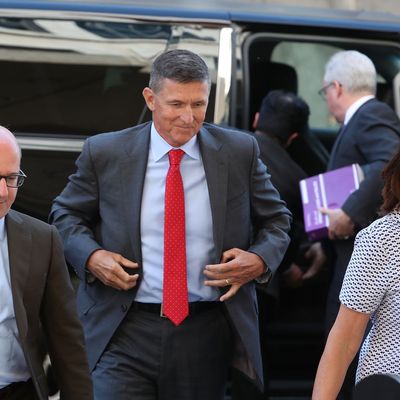
Last week, the Department of Justice took the extraordinary step of withdrawing charges against former Trump national security adviser Michael Flynn — charges Flynn had confessed to. Trump’s supporters exploded in celebration at Flynn’s “vindication,” the latest step in Attorney General William Barr’s campaign to discredit and undo the Mueller investigation. By sparing President Trump even the bother of having to pardon his criminal former associate, Barr was giving legal imprimatur to Trump’s view of Mueller as an out-of-control deep-state saboteur.
But a series of barriers has suddenly popped up to thwart Barr’s scheme.
First, earlier this week, a retired judge and two former U.S. Attorneys pointed out that this apparent legal coup does not have to end the matter. In an op-ed, the three legal eminences argued that the court has the power to bring in outside legal advisers to argue the case, even if the government has dropped its prosecution, and potentially still sentence the defendant.
Then, earlier this evening, the New York Times reported that Barr’s lawyers misled the court about the testimony of a key figure in the Flynn case. The Justice Department told the judge, Emmet Sullivan, that FBI notes indicated its agents only interviewed Flynn in order to trap him into lying. An FBI agent involved in the Flynn interview told the Department this wasn’t true, a fact the DOJ failed to include in its request to let Flynn go.
Then tonight, Judge Sullivan dropped a bomb. He announced that he would not simply rubber stamp Barr’s maneuver to free Flynn. Instead, he is bringing in a judge to review the case and provide the pushback against Flynn’s defense lawyers that is missing now that the DOJ has essentially joined in with Flynn’s legal team.
What may matter even more is the judge Sullivan picked for this job: John Gleeson, a former mob-busting prosecutor and, more to the point, one of the co-authors of the Post op-ed urging Sullivan to take this step.
Gleeson’s op-ed plainly states just how corrupt Barr’s move to free Flynn appears to be. It is worth closely reading his blunt description:
Prosecutors deserve a “presumption of regularity” — the benefit of the doubt that they are acting honestly and following the rules. But when the facts suggest they have abused their power, that presumption fades. If prosecutors attempt to dismiss a well-founded prosecution for impermissible or corrupt reasons, the people would be ill-served if a court blindly approved their dismissal request. The independence of the court protects us all when executive-branch decisions smack of impropriety; it also protects the judiciary itself from becoming a party to corruption.
There has been nothing regular about the department’s effort to dismiss the Flynn case. The record reeks of improper political influence. Hours after the career prosecutor abruptly withdrew, the department moved to dismiss the indictment in a filing signed only by an interim U.S. attorney, a former aide to Attorney General William P. Barr whom Barr had installed in the position months before.
Gleeson’s appointment does not guarantee Flynn will be sentenced. But it does seem to make that outcome at least very possible: It’s hard to imagine why Sullivan would take such an extraordinary step without giving the judge he appointed real authority. Indeed, Sullivan today raised the prospect Flynn could be charged with contempt of court.
Both Sullivan and Gleeson have no illusions as to what is happening here. Trump has appointed an attorney general who will be, as Trump plaintively called for in his first year, “my Roy Cohn.” Barr is carrying out the role just as Trump wants, twisting the law to protect Trump’s friends and hound his enemies.
In the end, the court can’t win: Trump can simply give Flynn a pardon. But there is a reason Barr maneuvered to prevent such a blunt outcome. He wanted his dirty work cloaked in the patina of legitimacy and vindication. Unfortunately for him, there are still people in the legal system who are unwilling to trash the rule of law. Should Trump secure a second term, there will be fewer of them.






























